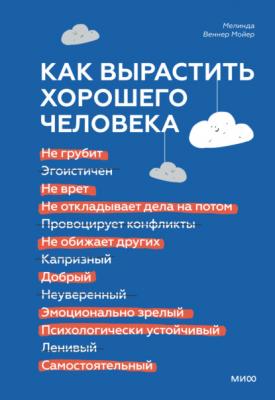Как вырастить хорошего человека. Научно обоснованные стратегии для осознанных родителей. Мелинда Веннер Мойер
Чтение книги онлайн.
Читать онлайн книгу Как вырастить хорошего человека. Научно обоснованные стратегии для осознанных родителей - Мелинда Веннер Мойер страница 14
 Paula Luengo Kanacri, Concetta Pastorelli, and Gian Vittorio Caprara, “Adolescents’ Prosocial Behavior Predicts Good Grades Beyond Intelligence and Personality Traits,” Journal of Personality 86, № 2 (April 2018).
Paula Luengo Kanacri, Concetta Pastorelli, and Gian Vittorio Caprara, “Adolescents’ Prosocial Behavior Predicts Good Grades Beyond Intelligence and Personality Traits,” Journal of Personality 86, № 2 (April 2018).
22
Damon E. Jones, Mark Greenberg, and Max Crowley, “Early Social-Emotional Functioning and Public Health: The Relationship Between Kindergarten Social Competence and Future Wellness,” American Journal of Public Health 105, № 11 (November 2015).
23
Celia A. Brownell, Margarita Svetlova, Ranita Anderson, Sara R. Nichols, and Jesse Drummond, “Socialization of Early Prosocial Behavior: Parents’ Talk About Emotions Is Associated with Sharing and Helping in Toddlers,” Infancy 18 (March 1, 2013): 91–119.
24
Nancy Eisenberg-Berg and Elizabeth Geisheker, “Content of Preachings and Power of the Model/Preacher: The Effect on Children’s Generosity,” Developmental Psychology 15, № 2 (1979): 168–175.
25
Brad M. Farrant, Tara A. J. Devine, Murray T. Maybery, and Janet Fletcher, “Empathy, Perspective Taking and Prosocial Behavior: The Importance of Parenting Practices,” Infant and Child Development 21 (2011): 175–188.
26
Martin L. Hoffman and Herbert D. Saltzstein, “Parent Discipline and the Child’s Moral Development,” Journal of Personality and Social Psychology 5, № 1 (1967): 47–57.
27
Julia Krevans and John C. Gibbs, “Parents’ Use of Inductive Discipline: Relations to Children’s Empathy and Prosocial Behavior,” Child Development 67, № 6 (December 1996): 3263–3277.
28
Carolyn Zahn-Waxler, Marian Radke-Yarrow, and Robert A. King, “Child Rearing and Children’s Prosocial Initiations Toward Victims of Distress,” Child Development 50 (1979): 319–330.
29
Maayan Davidov and Joan E. Grusec, “Untangling the Links of Parental Responsiveness to Distress and Warmth to Child Outcomes,” Child Development 77, № 1 (January/February 2006): 44–58.
30
Inge Bretherton, “The Origins of Attachment Theory: John Bowlby and Mary Ainsworth,” Developmental Psychology 28, № 5 (1992): 759–775.
31
Meghan B. Scrimgeour, Elizabeth L. Davenport, and Kristin A. Buss, “You Get What You Get and You Don’t Throw a Fit!: Emotional Socialization and Child Physiology Jointly Predict Early Prosocial Development,” Developmental Psychology 52, № 1 (January 2016): 102–116.
32
Nancy Eisenberg, Tracy L. Spinrad, Zoe E. Taylor, and Jeffrey Liew, “Relations of Inhibition and Emotion-Related Parenting to Young Children’s Prosocial and Vicariously Induced Distress Behavior,” Child Development 90, № 3 (May/June 2019): 846–858.
33
Джекил и Хайд – персонажи повести Роберта Стивенсона «Странная история доктора Джекила и мистера Хайда», олицетворяющие борьбу добра и зла. Мистер Хайд – «сосуд» для темных сил, двойник, стремящийся заменить, уничтожить личность доктора Джекила. Прим. ред.
34
Stuart I. Hammond and Celia A. Brownell, “Happily Unhelpful: Infants’ Everyday Helping and Its Connections to Early Prosocial Development,” Frontiers in Psychology 9 (September 21, 2018): 1770.
35
Stuart I. Hammond and Jeremy I. M. Carpendale, “Helping Children Help: The Relation Between Maternal Scaffolding and Children’s Early Help,” Social Development 24, № 2 (May 2015): 367–383.
36
Joan E. Grusec, Jacqueline J. Goodnow, and Lorenzo Cohen, “Household Work and the Development of Concern for Others,” Developmental Psychology 32, № 6 (1996): 999–1007.
37
Diotima J. Rapp, Jan M. Engelmann, Esther Herrmann, and Michael Tomas, “The Impact of Choice on Young Children’s Prosocial Motivation,” Journal of Experimental Child Psychology 158 (2017): 112–121.
38
Edward L. Deci, “Effects of Externally Mediated Rewards on Intrinsic Motivation,” Journal of Personality and Social Psychology 18, № 1 (1971): 105–115.
39
Anne van Goethem, Anne van Hoof, Bram Orobio de Castro, Marcel Van Aken, and Daniel Hart, “The Role of Reflection in the Effects of Community Service on Adolescent Development: A Meta-Analysis,” Child Development 85, № 6 (November/December 2014): 2114–2130.